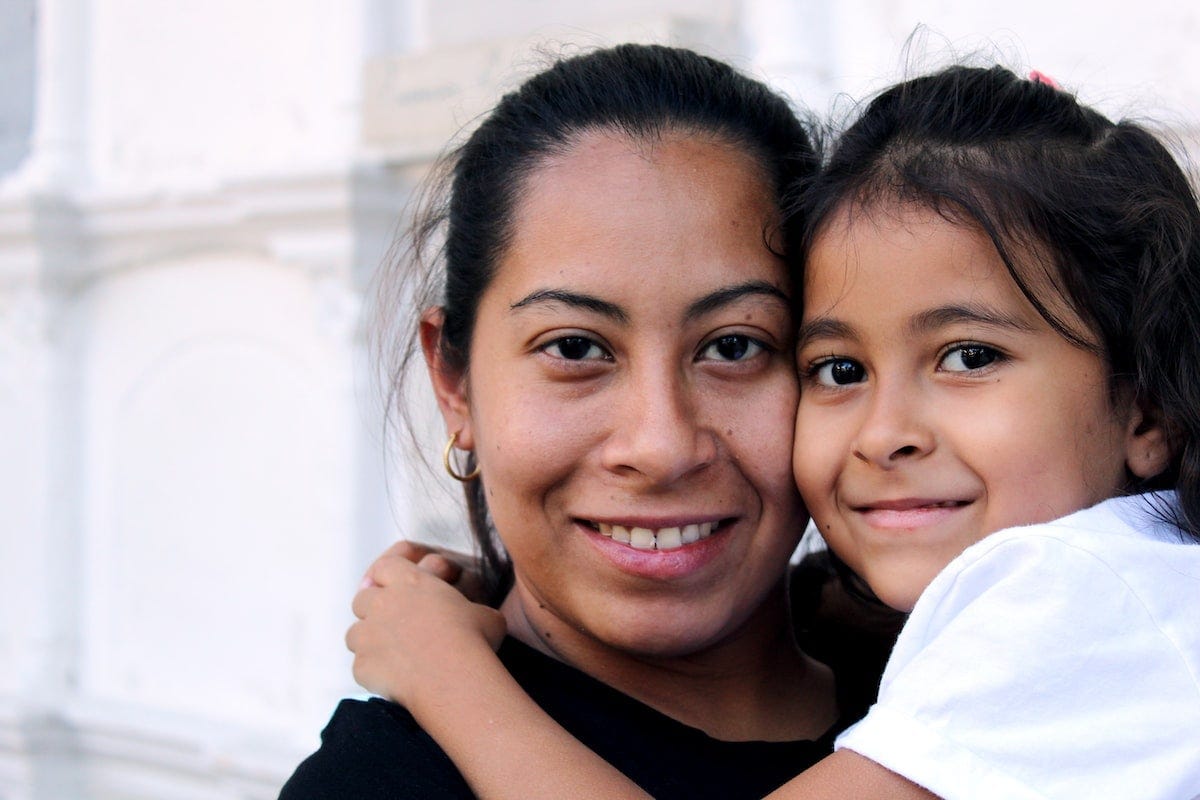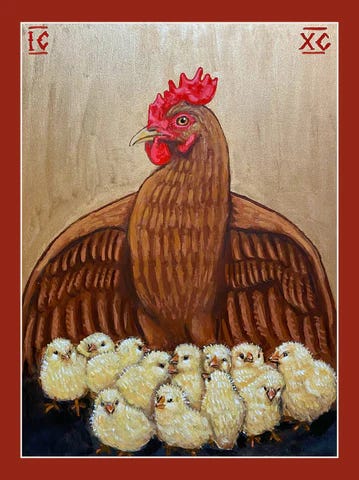Do You Experience God as a Lawgiver and Judge or a Lover and Nurturing Mother?

One of the biggest attractors in my journey from being an evangelical to a progressive Christian is how many of the progressive authors I read experienced a much more compassionate God than the one I knew. However, to my surprise, since being in more mainline and progressive Christian circles, I've seen many folks still holding on to the idea of God as a Lawgiver and Judge. Grant it, I live in Texas (often called the belt buckle of the Bible belt), so it may be the reality that everyone here has some level of Baptist in them.
My goal today is to unpack two drastically different views of God that shape our experience and relationship with God. There is the monarchical God and the nurturing mother God.
Though I have known God as Lawgiver and Judge for most of my Christian life, I only recently learned of this view being called the 'monarchical view,' a phrase coined by theologians Ian Barbour and Sallie McFague. New Testament Scholar Marcus Borg sees such a radical difference between these two images of God that...
"They virtually produce two different religions, both using the same language." (Days of Awe and Wonder, p. 150)
If you want to learn more about these contrasting views of God, I highly recommend picking up a copy of Days of Awe and Wonder by Marcus Borg.
The Monarchical God
Just this past weekend, my mother and wife conversed about what they were taught about God as little girls. Both shared the experience of having their primary caregivers present God as the great judge in the sky. God was kind of like Santa on steroids. To my mom and wife, God was the most significant threat that could be used to get them to fall in line. They were told things like;
"You better watch what you say, or God's going to punish you," or "God's watching, so you better behave."
Lawgiver
This view of God that shaped the two most influential women in my life is the Lawgiver and Judge. As a lawgiver, God is the one who tells us how to live, God is the one who gave us the Ten Commandments and the law, and it is God who tells us what's expected of us. This Lawgiver God even implicitly shapes how we view the Bible. We see this when people use the Bible as a topical life manual.
What does God think about money? Just look up the money verses to know the 'law' of economics straight from the mouth of God. What does God say about divorce? Look up all the verses on divorce, and you'll know God's final say on the matter. As an aside, if you've ever done that, how's that working out for you?
Judge
Not only is God the giver of the law, but as Judge, God is the enforcer too. We see this in various theological traditions that hold to some view of God coming back to judge us or judgment waiting for us at the end of this life. Whether we live or die, the idea is "God's going to get you."
Tied to God as Judge is the human condition. Because we aren't very good at keeping God's law, sacrifices must be made for our misbehavior (sin). In the Hebrew Bible, a system of requirements are set up through the temple sacrificial system. In the Christian Testament, God sends Jesus to die for our sins, thus making forgiveness possible.
In the monarchical view of God, God does love us, but that love is conditional. God loves us if we...
- Are good enough (what my mom and wife were taught)
- We repent of our sin
- Believe in Jesus
The fact is the system of requirements remains. God, as a Lawgiver and Judge, sees the law and judgment triumph over the love of God.
One of the ways I experience the God of law and judgment every Sunday in the Episcopal Church is through a designated time during the liturgy when we ask for forgiveness. I typically have the same recurring thought at this point in the service every week. When we're on our knees asking for forgiveness, I quietly think to myself,
"It's 11:35 am. I've been awake for maybe two hours, and I've apparently already screwed up enough to where I need to ask for forgiveness."
Let me ask a question: when God is the Lawgiver and Judge, who does that make us? It makes us defendants. Our lives are on trial, and everything we do or don't do, think or don't think, all of it is about getting it right or wrong. A combination of right belief and right behavior is at the core of getting things right.
Now, let's be fair. Sometimes, God isn't seen as a Lawgiver and Judge, but the system remains. Sometimes, we experience God as King and Father (always so patriarchal, I know). Yet, even in these images, functionally, God is still the giver and enforcer of the law (that's what Kings do), and as a father, he's usually a disappointed parent. Marcus Borg described the disappointed Father God as;
"The parent who loves us, yes, but who on the whole isn't all that pleased with how we've turned out." (Days of Awe and Wonder, p. 153)
In the end, Marcus Borg shares how the monarchial view of God has four lasting effects on us:
- God is the God of requirements. We have to measure up either by what we do, what we believe, or a combination of the two.
- We create in-groups and out-groups. For those who seemingly measure up, they begin to point the finger and look down at everyone who they believe doesn't. Alan Jacobs shares an interesting dynamic in his book How to Think: A Survival Guide for a World at Odds. For people in the out-group who want to be part of an in-group, what unites them is their shared desire to be seen as someone who is 'in.' However, once in the in-group, what creates a common bond is how much those on the inside are against the 'out-group.' So what unites outsiders is their desire to be on the inside. However, once they become an insider, what unites them is how they are against outsiders. This is what a monarchical view of God does to us.
- God is a God of vengeance. In this view, three things are universally valid: death, taxes, and judgment. Or, as New Testament Scholar John Dominic Crossan puts it,
"Jesus's second coming is 'divine ethnic cleansing; God is going to get all of the people not like us."
- We become focused on ourselves. Finally, we become fixated on ourselves instead of being liberated from self-consumption. Did I read the Bible? Did I pray? Did I fast? I gave money, but was it enough? Is God going to be upset?
God as a Lover and Nurturing Mother
For some, associating God with a lover or nurturing mother makes you uncomfortable. However, the Bible speaks of God as a lover and mother on multiple occasions. Here are three examples:
Psalm 91:1-4 (God as a Mother Hen protecting her chicks)
Assurance of God’s Protection
1 You who live in the shelter of the Most High,
who abide in the shadow of the Almighty,[a]
2 will say to the Lord, “My refuge and my fortress;
my God, in whom I trust.”
3 For he will deliver you from the snare of the hunter
and from the deadly pestilence;
4 he will cover you with his pinions,
and under his wings you will find refuge;
his faithfulness is a shield and defense.
Isaiah 43:3-5 (God as a lover)
4 Because you are precious in my sight
and honored and I love you,
I give people in return for you,
nations in exchange for your life.
5 Do not fear, for I am with you;
I will bring your offspring from the east,
and from the west I will gather you;
Luke 13:34 (Jesus associating himself with a mother hen wanting to protect her chicks)
34 Jerusalem, Jerusalem, the city that kills the prophets and stones those who are sent to it! How often have I desired to gather your children together as a hen gathers her brood under her wings, and you were not willing!
Though not a verse listed above, the greatest verse demonstrating God as a lover is the most well-known verse on planet Earth. John 3:16 starts with, "For God so loved the world..." Notice that God is in love with the world. The text doesn't say, "God is so pissed at the world," and it doesn't caveat "the world." It's not the world equals "Christians," or the "the church," or "the elect," it's not even just humanity. God loves the world, of which we are only a part.
If we are defendants in the monarchical view, what are we in this view? Marcus Borg answers;
"We are precious in God's sight and honored. God is 'in love' with us. We are the beloved of God. That's who we are in relationship with God as lover (and mother). God yearns for us." (Days of Awe and Wonder, p. 155)
Instead of being the one we need to please through right belief and right behavior, God is passionate about us and longs for a relationship with us! Within this view, there are three lasting effects on us:
- God is liberating. Like the origin story of Israel being freed from enslavement in the land of Egypt. God, as a lover and nurturing mother, is a liberator. God desires for no one to be kept in bondage but seeks our freedom both internally and externally.
- God is compassionate. Throughout the Bible, the term used to describe God as compassionate is a word that carries the imagery of being 'womb-like.' As a dad of four kids, I've had the privilege to witness firsthand how my wife is a nurturing mother to each of our children. She is life-giving; she nourishes our children physically, mentally, and spiritually and is passionate about their well-being.
- God is passionate about social justice. A mother is nurturing but closely tied to that nurturing nature is a fierce protectiveness for her babies. Why does God have a passion for social justice? Because the opposite of justice is not mercy but injustice. And there is no more significant threat to the loving and nurturing care of every human being than systemic injustice in all its forms.
As I wrote this article, an icon from the artist Kelly Lattimore kept coming to my mind and comforting me. It's called Christ: The Mother Hen.

Regardless of which image of God you have been raised to believe in or taught about, you can choose which vision you will follow. Life is short; the journey of faith has brought us to a fork in the road. Will you follow the way of the Lawgiver and Judge, or will you experience the compassion and passion of the Lover and Nurturing Mother? The choice is yours...🙏🏼❤️✌🏼




